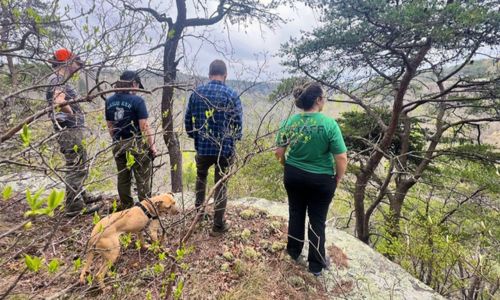Fort Payne, AL – Decades after the establishment of the Little River Canyon National Preserve through Congress with authorization from President George H.W. Bush, a pressing issue regarding the canyon’s preservation became evident. Jacksonville State University (Jax State) Canyon Center Director Pete Conroy recalls the disruptive construction of a large house directly across from the Canyon View pullover on Highway 176. The presence of the house diverted visitors’ attention from the natural beauty of the canyon, raising concerns about further real estate development along the canyon’s rim.
Despite nearly 15,000 acres being protected by the National Park Service as the Little River Canyon National Preserve, the east rim’s public-private boundary allowed for private construction. This prompted action from conservation organizations, including The Conservation Fund and the Alabama Nature Conservancy, which worked to protect the rim from additional development. However, these organizations did not intend to own the rim land indefinitely.
Enter Jacksonville State University. Andrew Schock, vice president and regional director of The Conservation Fund, contacted Conroy to propose a partnership with Jax State for land preservation. Unable to transfer the land directly to the National Park Service due to technical restrictions, Schock saw Jax State as a suitable steward for the land.
After discussions with Jax State’s Board of Trustees and approval from President Don Killingsworth, the university agreed to accept the land donation. Following a year of deliberation and assessment, two significant parcels were transferred to Jax State and the Canyon Center. Although the land was donated, the process incurred legal costs and required the establishment of a conservation easement, totaling approximately $20,000.
Pete Conroy highlighted the importance of the university’s gift shop revenue in covering these costs. Anna Lindsey-Brown, who manages the shop, has successfully turned it into a popular and respected place for visitors to purchase unique items. Conroy emphasized the impact of customer purchases, stating, “We are thrilled to have our revenue go to land conservation, and we definitely want our customers to know that their purchases really matter!”
The announcement of the land transfer was made during the National Park Service and Canyon Center Field School’s Annual Bio Blitz program, where biologists from around the state assess and catalogue the area’s various species. Conroy expressed pride in supporting both development and conservation efforts, saying, “We’ve been responsible for some development up here, and it only seems right that we also support the conservation of our primary resource, our beautiful Little River Canyon.”
This partnership between Jax State and conservation organizations ensures the continued protection of Little River Canyon’s east rim, preserving its natural beauty for future generations.












